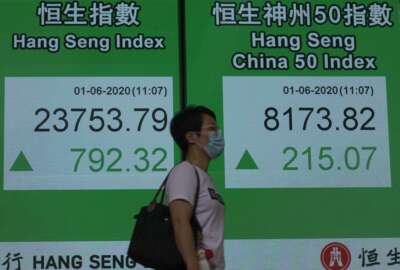If your like most active and retired federal investors you have little or no money in the I fund of the Thrift Savings Plan. The I stands for international stocks which, while they can produce tremendous gains, are too volatile for many if not most investors.
But a relatively small group of feds love the option of being able to invest tax-deferred money with a government match into other economies. They see potential gold in both emerging and established markets. Remember the Celtic tiger, or the Latin American booms of the past? They see offshore stocks as the ultimate diversity, but they are a minority of TSP participants.
Which is why relatively few investors, watching their retirement nest eggs during these turbulent times, yawned when the board that runs the $611.9 billion (as of May 31) TSP backed away from an earlier decision to broaden the international investment options by switching the I fund into a new, broader international fund that included the second largest economy: China.
The Trump administration, which has run hot and cold toward China, flipped out and urged/directed/demanded/ordered that the board stick with the current fund. Backers of the move to stay in the current no-China investment fund said it’s good business, and that this is the wrong time to be rewarding China with investment money from American civil servants and the federal government itself, while China is tangling with India and many of its neighbors over turf and oil reserves, putting pressure on Taiwan and Hong Kong and generally, to many people, unnecessarily rocking the boat.
Those who wanted a more diverse I fund say it is absurd to exclude one of the largest and most dynamic economies on the planet because of political differences.
So how much, if at all, should political differences which are often temporary or, in the long run, flat out wrong influence federal TSP policies. Which prompted this letter from a reader who says the decision was a no-brainer. In a situation like this, the decision is always political, he said:
“Of course it is political, but so was the decision to include China in the first place.
“The ‘politics’ of adding China is that ‘China is just like all the other emerging economies. The politics of not adding it, is that ‘China is not like the other emerging economies.’ Remember ‘One of these is not like the others. One of them is not the same?’
“As an analogy, pretend it was 1935 or 1936 and the TSP was considering investing in foreign companies. So they look at England, France, Germany, Italy, China and Japan. But a year later, well maybe don’t invest in Japan as it has invaded China, and maybe not in China as it has been invaded? And then Herr Hitler and Il Duce have been making some very angry sounding speeches so let’s exclude Italy and Germany also.
“As of right now, China has broken all the treaty protection it gave the Hong Kong people. It has been waging a political and diplomatic war against Taiwan for decades. It is exerting its military might in the South China Sea, threatening to take over islands and sea bed historically considered to belong to other nations. Not to mention the blatant espionage it does in the U.S. and other western countries. China has been waging currency and trade wars with the U.S. and to a lesser extent with Europe for a very long time. And not to mention, based on recent fraud in Chinese company financial reports, you can’t believe anything. The report might be accurate, but just as likely the numbers have been fudged. It’s as if you have to assume every company is using Enron-type accounting unless proven otherwise.
“And the index makes no differentiation between those two types of companies.
“China is not like the other ’emerging economies.’ And the currency and trade wars could result in a real cyber war fairly soon, and that might be followed by a hot war (aka kinetic war or shooting war like that which Italy, Germany or Japan engaged in starting in 1939).” — Hank at the Energy Department
Nearly Useless Factoid
By Amelia Brust
It is possible to reach France via a 16-mile boat ride from Canada. Saint Pierre and Miquelon is a self-governing territorial overseas collectivity, located off the coast of Newfoundland and Labrador province, and the only part of New France still under the country’s control. It measures 93 square miles and has a population of about 6,000 people.
Source: Wikipedia
Copyright
© 2024 Federal News Network. All rights reserved. This website is not intended for users located within the European Economic Area.
